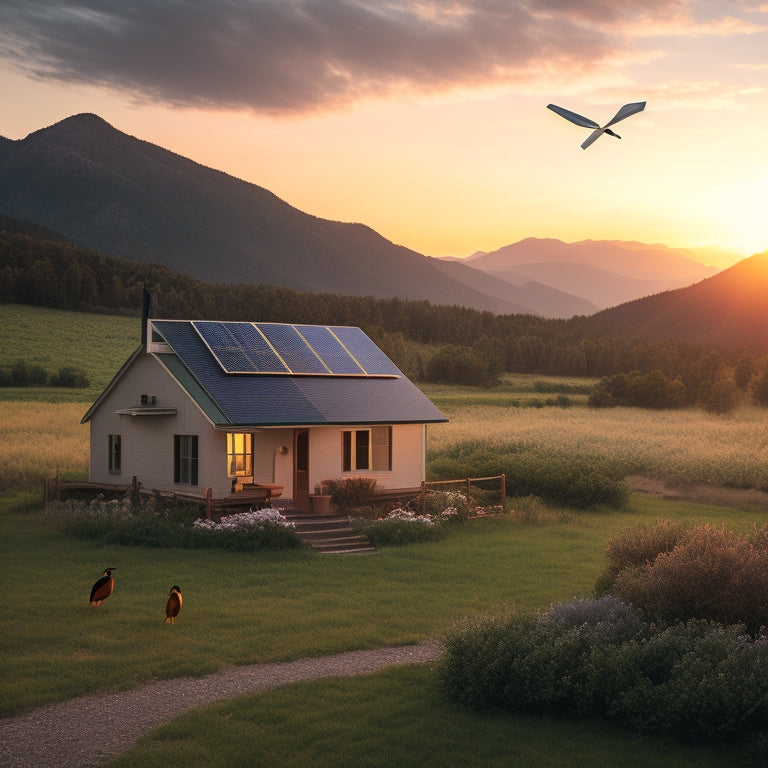
Why Choose Off-Grid Home Power Systems
Share
By choosing an off-grid home power system, you're not only breaking free from the grid's constraints but also investing in a sustainable, cost-effective, and reliable source of energy that can greatly enhance your overall quality of life. You'll enjoy energy independence, lower electricity bills, and a reliable power supply during outages or disasters. Plus, you'll reduce your carbon footprint and increase your property value. With less maintenance required and government incentives available, the benefits of off-grid systems are undeniable. And, as you investigate this alternative energy solution further, you'll uncover even more advantages that make it an attractive choice for your home.
Key Takeaways
- Off-grid home power systems provide energy independence, reducing reliance on external sources and promoting freedom in location choice.
- Transitioning to off-grid systems significantly reduces carbon footprints and greenhouse gas emissions, contributing to a cleaner environment.
- Off-grid systems ensure reliable power supply during outages and disasters, with battery storage providing backup power and automated switching minimizing disruptions.
- Homeowners can lower electricity costs through the utilization of renewable energy sources like solar and wind, and optimize energy consumption for maximum efficiency.
- Government incentives, such as federal tax credits and grant programs, can help offset the initial expenses of transitioning to an off-grid home power system.
Energy Independence and Freedom
Your own energy independence and freedom can be a reality with an off-grid home power system. You'll no longer be reliant on the grid, giving you autonomy and control over your energy needs.
One of the significant off-grid benefits is energy self-sufficiency, allowing you to generate your own power and reduce your reliance on external sources.
With solar power solutions scalable systems, you can initially install a small system and expand it in the future as your energy needs grow. This means you'll be less affected by power outages, rate hikes, and grid instability.
With an off-grid system, you'll have the freedom to live where you want, without being tied to the grid. You'll also be contributing to a more sustainable future, reducing your carbon footprint and dependence on fossil fuels.
Lower Your Electricity Bills
With an off-grid home power system, you're in the driver's seat when it comes to controlling your energy costs. You can greatly lower your electricity bills by utilizing renewable energy sources like solar or wind power. By generating your own electricity, you reduce your reliance on the grid, resulting in considerable energy savings.
This cost reduction can be considerable, especially for homes located in areas with high energy rates. In addition, off-grid systems allow you to optimize your energy consumption, reducing waste and maximizing efficiency. By monitoring your energy usage, you can identify areas for improvement, making adjustments to further minimize your electricity bills.
Energy independence and autonomy are key benefits of off-grid systems, which also contribute to a reduced carbon footprint. Moreover, solar power systems can increase your property value, making your home more attractive to potential buyers.
With an off-grid home power system, you'll enjoy remarkable cost savings and a reduced carbon footprint.
Reliable Power Supply Always
Off-grid home power systems provide a reliable power supply, guaranteeing you have electricity when you need it most. You can rest assured that your lights will stay on, your refrigerator will keep running, and your communication devices will remain connected, even during grid outages or natural disasters.
This reliability is made possible by:
Off-grid systems are designed to prioritize energy autonomy, incorporating advanced features like built-in monitoring and control to provide real-time energy observations. They also focus on charging efficiency, guaranteeing that your energy storage is optimized.
-
System integration: Off-grid systems are designed to work seamlessly together, guaranteeing a consistent flow of power to your home.
-
Battery storage: Excess energy generated by your system is stored in batteries, providing backup power when needed.
-
Automated switching: Your system automatically switches to battery power during outages, minimizing disruptions.
- Redundancy: Critical components are duplicated to guarantee continuous operation, even in the event of component failure.
Environmental Benefits Abound Here
You'll greatly reduce your carbon footprint by switching to an off-grid home power system, which relies on renewable energy sources instead of fossil fuels.
This translates to a substantial decrease in greenhouse gas emissions, contributing to a cleaner environment.
Reducing Carbon Footprint
By integrating renewable energy sources into your off-grid home power system, carbon emissions decrease markedly. This reduction in carbon footprint is a significant environmental benefit, and it's just the beginning.
Here are some ways you'll contribute to a cleaner environment:
-
Lower greenhouse gas emissions: By utilizing solar power, you'll reduce your reliance on fossil fuels, leading to a decrease in emissions that contribute to climate change.
-
Increased solar panel efficiency: Advances in technology have improved the efficiency of solar panels, allowing you to generate more power with less equipment.
-
Improved battery storage options: With better battery storage, you can store excess energy generated during the day for use at night or during power outages.
- Reduced air pollution: By using renewable energy, you'll reduce air pollutants like particulate matter, nitrogen oxides, and sulfur dioxide, improving local air quality.
Renewable Energy Sources
More than 70% of off-grid homeowners rely on renewable energy sources to power their homes, and for good reason.
You'll benefit from free, sustainable energy that reduces your reliance on fossil fuels and lowers your carbon footprint.
Solar panels and wind turbines are popular choices, utilizing energy from the sun and wind to generate electricity. These sources are clean, abundant, and virtually maintenance-free.
With solar panels, you can capture energy even on cloudy days, while wind turbines can generate power at speeds as low as 5-7 mph.
Increased Property Value Guaranteed
By investing in an off-grid home power system, you're not only reducing your reliance on the grid, but also increasing your property's value through renewable energy upgrades.
Energy independence enhances your property's appeal, making it more attractive to potential buyers if you decide to sell.
Additionally, the sustainable living appeal of an off-grid home can be a major selling point, setting your property apart from others in the neighborhood.
Renewable Energy Upgrades
As you evaluate upgrading your off-grid home power system, integrating renewable energy sources can greatly enhance your property's value.
By incorporating sustainable energy solutions, you can increase your property's appeal and resale value.
Here are some key upgrades to reflect on:
-
Solar Panel Installation: Utilize the power of the sun to generate electricity and reduce your reliance on traditional energy sources.
-
Wind Turbine Options: Investigate wind turbine options that can provide a supplemental power source, especially in areas with consistent wind patterns.
-
Battery Storage Solutions: Implement energy storage solutions that allow you to store excess energy generated by your renewable sources for later use.
- Hybrid Systems Integration: Combine multiple renewable energy sources, such as solar and wind, with energy management systems to optimize your off-grid power system's performance.
These upgrades not only increase your property's value but also provide a sustainable and reliable source of energy.
Energy Independence Boosts
Achieving energy independence is a significant selling point for off-grid homes, and it can substantially improve your property's worth.
By implementing self-sufficiency strategies, you can differentiate your home from traditional grid-tied properties, making it more attractive to potential buyers. Off-grid homes with reliable remote power solutions are highly sought after, especially in areas with frequent power outages or limited grid access.
As a result, your property's worth will increase, providing a higher return on investment. With energy independence, you'll also enjoy reduced energy costs and a reduced carbon footprint, further enhancing your property's appeal.
Sustainable Living Appeal
Many homeowners and potential buyers nowadays prioritize eco-friendliness and sustainability, driving up demand for off-grid homes with renewable energy systems.
You're likely one of them, seeking an eco-friendly lifestyle that benefits the environment and your community.
By choosing an off-grid home power system, you're making a statement about your commitment to sustainability.
This appeal doesn't go unnoticed, as it:
-
Boosts property value: Off-grid homes with renewable energy systems are highly sought after, increasing your property's value and appeal.
-
Fosters community involvement: You'll be part of a community that shares your values, promoting a sense of belonging and cooperation.
-
Encourages eco-friendly choices: Living off-grid inspires you to adopt sustainable practices, reducing your carbon footprint and promoting environmental stewardship.
- Supports a healthier environment: By relying on renewable energy, you're reducing your reliance on fossil fuels, contributing to a cleaner, healthier environment for future generations.
Less Maintenance Required Overall
One of the most significant advantages of off-grid home power systems is that they require less maintenance overall.
You'll notice a significant reduction in upkeep costs and time spent on repairs. This is because off-grid systems have fewer moving parts and are less prone to mechanical failures.
Additionally, they're designed to operate independently, reducing reliance on external infrastructure that can be prone to outages.
As a result, you'll experience increased system efficiency, leading to long-term savings on energy costs.
With an off-grid system, you can enjoy a hassle-free energy solution that lets you focus on what matters most – your daily life.
Government Incentives Available Now
Since off-grid home power systems already offer a range of benefits, you may be surprised to learn that the government also provides incentives to encourage their adoption.
These incentives can help offset the initial cost of converting to clean energy, making it more accessible to homeowners like you.
Some of the government incentives available include:
-
Federal Tax Credits: Receive a credit of up to 26% of the total cost of your off-grid home power system.
-
State and Local Rebates: Take advantage of rebates offered by your state or local government to reduce the upfront cost.
-
Grant Programs: Investigate grant programs that provide funding for renewable energy projects, such as the USDA's Rural Energy for America Program.
- Financing Options: Look into financing options, like the Federal Housing Administration's (FHA) Energy Efficient Mortgage program, to help you finance your off-grid home power system.
Frequently Asked Questions
Can Off-Grid Home Power Systems Be Installed in Urban Areas?
As you venture into the world of renewable energy, you'll uncover that off-grid home power systems can be installed in urban areas, offering you a guiding light of energy independence, despite the concrete jungle surroundings.
Are Off-Grid Power Systems Compatible With All Types of Homes?
You'll find that off-grid power systems are compatible with various home types, from modern to traditional, and from small cabins to large estates, as long as you assess system compatibility based on your home's energy requirements and layout.
How Long Does It Take to Install an Off-Grid Power System?
You'll find that the installation timeline for an off-grid power system varies, depending on the complexity of the system and installation challenges, but on average, it takes around 2-5 days for a typical residential setup.
Can I Add to My Off-Grid System if My Energy Needs Increase?
You can easily add to your off-grid system if your energy needs increase, thanks to its scalable design and energy storage capabilities, allowing you to upgrade or expand your system as your requirements change.
Will an Off-Grid Power System Affect My Home's Resale Value?
You're wisely wondering whether an off-grid power system will weigh on your home's worth; fortunately, it often won't, as savvy shoppers seek sustainable spaces, and market trends suggest off-grid features can even enhance resale potential.
Related Posts
-

Top Portable Refrigerators for Camping Adventures
When you're camping, having a reliable portable refrigerator can make all the difference for keeping your food fresh ...
-

Solar Powered Lights for Sustainable Home Decor
Solar-powered lights offer a stylish and eco-friendly way to enhance your home decor. They capture sunlight, converti...
-

Essential Hiking Lights for Safety and Fun
When you're hitting the trails, essential hiking lights are vital for safety and fun. A lightweight headlamp offers h...


